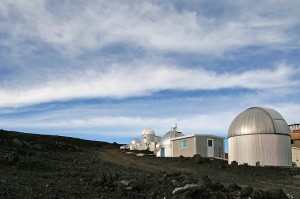Scientists Fear Losing Ground on Climate Change As Carbon Dioxide Levels Rise
-
Marie Cusick

Leahleaf/ via Flickr Creative Commons
The Mauna Loa Observatory in Hawaii has been a key spot for monitoring global carbon dioxide levels.
The New York Times reports scientific monitors reveal the average daily level of carbon dioxide in the air has surpassed the long-feared milestone of 400 parts per million:
The best available evidence suggests the amount of the gas in the air has not been this high for at least three million years, before humans evolved, and scientists believe the rise portends large changes in the climate and the level of the sea.
“It symbolizes that so far we have failed miserably in tackling this problem,” said Pieter P. Tans, who runs the monitoring program at the National Oceanic and Atmospheric Administration that reported the new reading.
Ralph Keeling, who runs another monitoring program at the Scripps Institution of Oceanography in San Diego, said a continuing rise could be catastrophic. “It means we are quickly losing the possibility of keeping the climate below what people thought were possibly tolerable thresholds,” he said.
Assuming a doubling of carbon emissions –which we are on track for– more than a dozen climate models predict substantial warming (in the range of 3 to 8 degrees Fahrenheit) by the end of this century.
Although there is widespread concern about climate change in the scientific community, it has become a highly politicized issue.
Climate change came up earlier this year at a budget hearing in Harrisburg for the state Department of Environmental Protection. When confronted by Democratic legislators, former DEP Secretary Michael Krancer was reluctant to embrace the scientific consensus around the issue.
“The issue is called global warming,” Krancer told StateImpact Pennsylvania, “It is not called American warming. It’s not called Pennsylvania warming. Any unilateral action by any one country probably will be a fool’s errand. It won’t work.”
As the Corbett administration looks to name Krancer’s permanent successor, the governor’s chief of staff, Steve Aichele pointed to the year-old Act 13 shale gas impact fee as an example the governor’s commitment to tough environmental regulation.
“The idea of environmental protection in our administration is paramount,” Aichele told StateImpact Pennsylvania.
When asked if the Governor plans to appoint a new DEP Secretary who would put a greater focus on combating climate change, Aichele was reluctant to answer.
“I’m not a climate change person. I don’t know enough about it to debate it.”
















